How to identify rogue affiliates using advanced segments
This post will explain a technique that online retailers can use to save some badly spent money. It will also be of interest to affiliates, to website owners, and may spark a couple of ideas for anyone looking to get more usable information out of Google Analytics.

The post covers 4 things:
- Rogue "Brand bidders" - what they are, why they cause a problem, and how they waste money.
- A few tactics rogue brand bidders may use to sneakily make thousands of pounds.
- How to spot the problem using Google Analytics.
- A couple of bonus tips on how you could extend & automate this.
Brand bidding
If you work in the ecommerce or affiliate worlds, you may know what a brand bidder is. If not, then here"s a 3-sentence summary that attempts to explain a fairly complicated concept:
- "Affiliates" are people who send visitors to commercial websites, in exchange for money whenever those visits result in a purchase (or a lead of some kind) - this money is referred to as "commission".
- Some affiliates use pay-per-click advertising (AdWords) to send visitors to retailers" websites.
- The vast majority of sites that accept PPC affiliates do so on the understanding that those affiliates can"t use the site"s brand name in any shape or form in their PPC ads. Here"s some wording from Sainsbury"s for example:

Affiliates who place PPC ads targeting retailers" brand terms are known as "brand bidders".
The difference between brand-bidding and other PPC ads
Why do online merchants disallow affiliates from brand bidding? Here are 2 PPC ads that perhaps help explain:

In this first ad (the "generic" PPC ad), the visitor has searched for the phrase "buy flowers". In other words, they know what they want to buy, but they haven"t yet decided where to buy it. A PPC ad for interflora is displayed top as a result.
There is a chance that an ad like this will persuade the searcher to buy from Interflora, and even a chance that Interflora may gain a new customer.

In the second ad (the "brand" PPC ad), the searcher is already looking for Interflora. Again, an Interflora ad is displayed. But the ad itself has no effect on where they"re going to buy from - they had already chosen Interflora before they saw the results.
In other words, the 'generic' ppc ad is valuable for the merchant, potentially bringing them a sale they would not otherwise have gained. The 'brand' advert on the other hand adds only a tiny, tiny amount of value (it makes it slightly easier for the searcher to click through to the site).
Here"s a very rough example of how these 2 may stack up for a brand bidding affiliate:
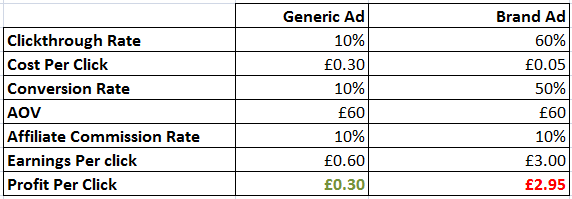
In other words, though the brand ad is vastly less valuable for the retailing merchant, it is vastly more profitable for a rogue affiliate who can advertise against it without the merchant noticing.
More reasons rogue brand-bidding is bad...
Firstly, rogue brand bidders are bad for genuine affiliates:
- Brand bidders lower the profitability of the affiliate channel, meaning the retailer can afford to give less money away to genuine affiliates. Most merchants use affiliates to try & drive "new" customers. Brand bidding drives repeat customers rather than new.
- They skew the stats of the overall affiliate program. Brand searchers are far more likely to buy than an average visitor. This means the affiliate network displays a vastly inflated conversion rate for the retailer, making it hard for genuine affiliates to judge whether the program is worthwhile.
- They overwrite genuine affiliate cookies. If an affiliate sends traffic to (say) PC World through the term "buy HP laptops", the buyer may see the laptop they"re interested in, but decide to come back to the site later on. If they come back later on by searching for "PC World", and they happen to go through an affiliate PPC brand ad, that affiliate"s cookie will overwrite the original, and the earlier affiliate won"t get their rightful commission.
Secondly, rogue brand bidders are bad for retailers:
- They can cost a huge amount of money. If they"re not spotted, the retailer can give away tens of thousands of pounds in commission for sales they would have received anyway.
- They destroy confidence in the affiliate channel. Affiliates can add a whole lot of value to a retailer, but if something like this costs a retailer a lot of money, it"s very hard to explain to a finance director or CEO that it was just one bad apple among a group of great affiliates.
- There"s no value being added. It"s really easy to run PPC on brand terms. A retailer can do this without any technical know-how or real ongoing management. A rogue brand bidder isn"t helping the retailer in any way really, just taking money for very little effort.
Tactics affiliate brand bidders use to avoid being spotted
Here are 4 tactics some rogue affiliates may use to bid on a merchant"s brand without being spotted:
Tactic 1: Using identical ads to the retailer's own ads.
Rogue affiliates may use PPC adverts that look identical to the retailer"s own brand ads. The only difference here would be the affiliate would use their own tracking URL. If the retailer saw the ad, but didn"t click through & check the URL, they would have no reason to suspect anything was odd here.
Tactic 2: Advertising outside office hours.
A brand bidding affiliate might set up ads to show between (say) 11pm and 5am; a time at which most retailers won"t be surfing the web & wouldn"t stumble across a rogue PPC ad.
Tactic 3: Advertising in different locations.
If your headquarters are in London, a rogue affiliate may place PPC ads in areas all over the country, specifically excluding London.
Tactic 4: Spreading out the budget.
It"s easy to advertise with AdWords using a small budget across a long time period. A rogue affiliate can easily cap their budget so that the ad shows only very periodically, and they"re only passing 3 or 4 sales a day through brand ads.
How to use Google analytics to spot rogue brand bidding
Thankfully, you can use Google Analytics to spot this going on in a lot of cases.
These are all fairly trivial tactics, but they can cost retailers a lot. For example, a merchant I worked with once saved tens of thousands in the run-up to Christmas thanks to a vigilant affiliate agency. As a result, we set up some simple tools to monitor this & managed to spot several more. One of these tools was the following:
HOW TO CREATE AN "ADVANCED SEGMENT" OF VISITORS THROUGH BRAND BIDDING AFFILIATES
The vast majority of affiliate programs will add extra information to your URLs as part of the way they track which affiliates are sending traffic. Here are a few examples:
- http://www.retailer1.com/?src=wbg1&siteid=1234
- http://www.retailer2.com/?extid=af_b_vouchercodes_site1234
- http://www.retailer3.com/?src=AW&ref=1234 (we"ll use this as an example in a moment)
Each of those identifies where the traffic has come from. For example, in the third URL, 'src=AW' identifies that this traffic is from the affiliate network. 'ref=1234' identifies that it is from an affiliate with the unique identifier '1234'.
A nice bi-product of those extra parameters appearing in URLs is that they allow you to create an "advanced segment" within Google Analytics. This then lets you view almost any report in Google Analytics just for traffic that came to the site via affiliates.
Here's how we'd set up this segment using the third example URL above:
- In the left-hand menu of Google Analytics, go to "advanced segments".
- At the top-right of the screen, choose "Create Custom Segment".
- Create something that matches the following:
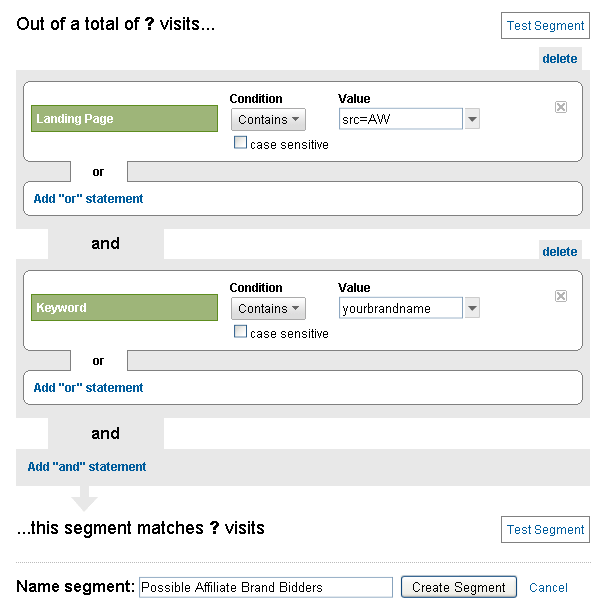
To create the above, we do the following:
- From the left-hand menu, in "Content", we choose "Landing Page" and drag that into the box in the main content area as pictured above. We then set the condition to "contains" & the value to "src=AW". This says "€œWe"re only interested in looking at traffic that landed on a page with "src=AW" somewhere in the URL.
- We then click "add and statement", & drag "Keyword" from the "Traffic Sources" box & select "contains" and enter our brand name into the "Value" box.
- We then name the segment "Possible Affiliate Brand Bidders" & click "create segment".
In sum total, this says, "we only want to see people who A) landed on the site on a page that contains "src=AW", and B) where the keyword the searcher had used contains our brand term".
How does this help!
From here, we"re able to view most reports in Google Analytics for this particular segment. To do this, from any report within G.A, go to the top-right of the screen, click on the 'Advanced Segments' dropdown & select the segment you've created.
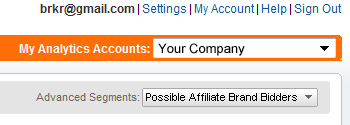
A nice place to start when analyzing this is the "Top Landing Pages" report. To view this, use the left-hand menu in Google Analytics, and choose 'Content > Top Landing Pages':
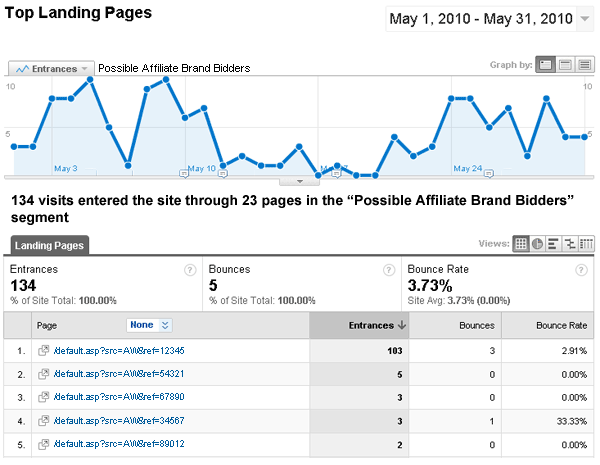
Immediately, just from the above, we can see Google Analytics has flagged a group of people it believes has sent visitors from brand search. From here, we can go through those 'refs', each of which will correspond to one of our affiliates. We can then see if they are false positives, if they are people we have allowed to brand bid, or if we should speak to our affiliate network to dig deeper.
Other reports you may wish to look at:
- Look at your traffic over time through this segment. If you've had a big peak in traffic at any point, dig deeper into that.
- Create further segments of individual affiliates you're most interested in.
- Create a segment that just tracks performance of affiliates in general, use that to look for big spikes/anomalies in conversion rates.
A few things to watch out for:
There are a couple of circumstances where the above wouldn't work. One is if someone blocks the referring domain & Google Analytics is unable to see that the visit came from search (in theory, Google would stop this ad, but other search engines may not). Another is where your affiliate network doesn't include any parameters in URLs that you can use to identify affiliate traffic. A workaround that will work in some cases is to add a parameter to your own brand traffic. Create an advanced segment then of brand traffic that doesn't include that parameter. If you have any workarounds for other scenarios where this may not work, please do let us know in the comments.
& + bonus advanced tips
If you're particularly worried about this, you can use Google Analytics' 'Intelligence' to automatically email you when it thinks there's a problem. To do that you have to create a whole new analytics profile of just your affiliate traffic. Once you've created that, go to 'Intelligence > Weekly Alert > Create a Custom Alert' within the profile. Tick 'email me when this alert is triggered' & use something like the following:
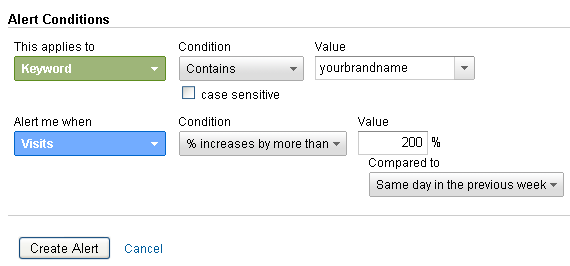
What that says is "if the number of brand-related searches driven to my site by affiliates jumps by more than 200% from week to week, send me an email to notify me".
Well I hope that helps you combat the rogues - "be alert"!















